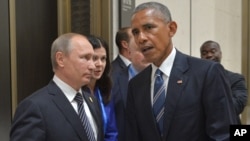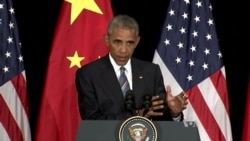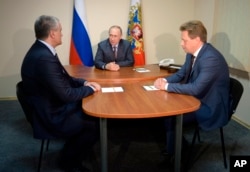President Barack Obama says he had "productive" talks with his Russian counterpart Vladimir Putin on Syria, but the two sides have yet to reach a cease-fire deal to allow more humanitarian aid to the war-ravaged country.
Obama made the comments Monday in a wide-ranging news conference at the close of a Group of 20 Nations Leaders Summit in Hangzhou, China, after meeting with Putin.
The two discussed what a "real cessation of hostilities" would look like, but "given the gaps of trust that exist that is a tough negotiation," Obama sad. Both leaders have instructed their top diplomats to continue working for a deal.
WATCH: President Obama on US-Russia discussions
Remaining obstacles
A potential cease-fire would involve the Syrian government, a Russian ally, and rebels supported by the United States to aid some of the millions of Syrians in need of food and medical supplies.
The two countries appeared to be closing in on a possible deal on Sunday, but major obstacles remained. A State Department official said Russia walked back on some of the areas the United States thought were agreed on by both parties.
Obama lamented that conditions in Syria have "slowly unwound and we're back into a situation where (Syrian President Bashar al-) Assad's regime is bombing with impunity."
The civil war in Syria has killed more than 250,000 people, displaced 11 million and led to a refugee crisis in the Middle East and Europe. The conflict is also contributing to a rise in militant Islamist groups. Previous cease-fire agreements have failed to last for long as both back opposite sides in the five-year war.
Ukraine
The United States and Russia have also been working to find a diplomatic solution to the crisis in Ukraine, where fighting between pro-Russian separatists and government troops has claimed the lives of more than 9,500 people since 2014.
In his news conference, Obama said he made clear to Putin that U.S. sanctions will remain until the Minsk ceasefire for Ukraine is implemented. He described his conversation with Putin on the matter as "constructive, but not conclusive."
Despite the peace accords signed in the capital of Belarus, Minsk, in 2015, which initially helped to halt the fighting and then lower its intensity, international monitors have observed more clashes in the past weeks, some involving heavy weaponry.
Obama said both sides should seize the opportunity to finalize the ceasefire deal in the coming weeks.
Philippines
The U.S. president will now head to a gathering of the Association of Southeast Asian Nations (ASEAN) in Laos, where he is expected to meet with a wide range of regional leaders.
One leader Obama may wind up not meeting with is Philippines President Rodrigo Duterte, who on Monday warned the U.S. president not to question him about extrajudicial killings in his country.
Duterte's war on drug trafficking has killed more than 2,400 in just more than two months. But if Obama brings up the deaths, Duterte warned Obama: "Son of a b****, I will swear at you."
Asked about the threat, Obama described Duterte as a "colorful guy" and said he was asking his staff to determine whether a meeting would be useful.
"I always want to make sure if I'm having a meeting that it's actually productive and we're getting something done," Obama said.
The U.S. president said he recognizes the "significant burden that the drug trade plays," and conceded that "fighting narco trafficking is tough."
"But we will always assert the need to have due process and engage in that fight against drugs in a way that's consistent with basic international norms," Obama said.
"If and when we have a meeting, this is something that will be brought up," he added.
Free trade deal
A major topic for Obama's trip to Asia is the Trans-Pacific Partnership free trade deal, or TPP, which has been agreed to by 12 nations, but not yet ratified.
The TPP has run into major domestic opposition in the United States, with both Democratic presidential nominee Hillary Clinton and her Republican rival Donald Trump opposing it.
Obama said there was rarely a "smooth, uncontroversial path" to ratifying trade deals, "but they eventually get done and it's my intention to get this one done."
Asian leaders see the TPP as the right thing to do, Obama said. "Back home, we'll have to cut through the noise once election season is over," he said.
State Department correspondent Steve Herman contributed to this report.








